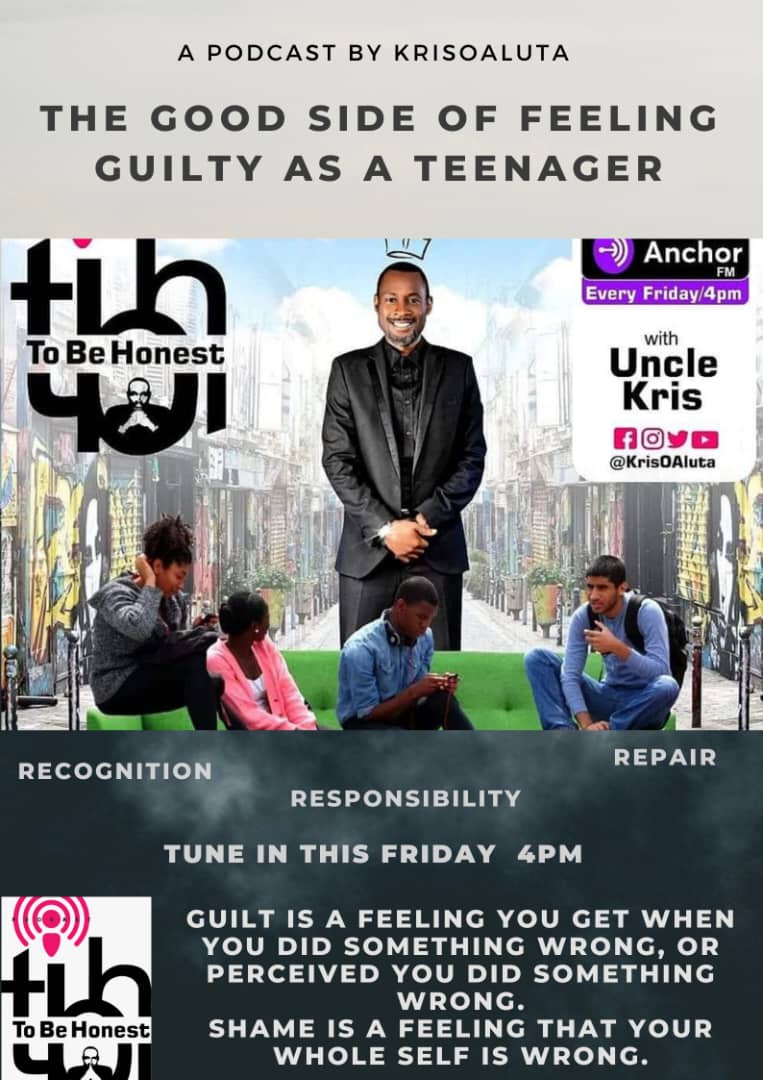The Positive Side of Feeling Guilty

“For the kind of sorrow God wants us to experience leads us away from sin and results in salvation. There’s no regret for that kind of sorrow. But worldly sorrow, which lacks repentance, results in spiritual death”. 2 Corinthians 7:10 NLT.
Guilt is a feeling you get when you did something wrong, or perceived you did something wrong. It is an emotional discomfort you feel when you believe that you were responsible for something that offended or hurt someone else. . Guilt is specific, you can trace what is making you feel guilty(https://centerstone.org/our-resources/health-wellness/get-rid-of-guilt/).
Shame on the other hand according to psychologists, is an unpleasant self-conscious emotion often associated with negative self-evaluation, and feelings of pain, powerlessness, and worthlessness. A feeling that makes one lose their self-honor and self-respect. Shame is a feeling that suggest one is worthless and not worthy of forgiveness, which is not very helpful.
Inner Voices
In one of our previous podcasts, we talked about our inner voices and Automatic Negative Thoughts(ANT), something that teens must deliberately train their mind to live above. For example, you did something wrong a genuine mistake and you are scolded by your parents and your inner voice says, you are always doing something wrong, you are worthless and of no value to yourself and your parents. This feeling, which is not true, has the potential of leaving you in the realm of shame, which the passage we read from the bible talks about, results to spiritual death, which in another word could mean depression.

Feeling guilty can turn us into better teenagers, but shame on the other hand is not so helpful. Feeling guilty about hurting a friend can motivate you to want to take steps towards remedying the situation. Feeling Shameful on the other hand does not provide us with the same benefits as guilt. When we feel ashamed, we want to hide the source of our shame, run away with the issue, and not fix it. Shame does not make us want to take responsibility. Shame makes us want to sweep things under the carpet, preserving our reputation, which eventually can push us to depression.
As teenagers on this journey of self-discovery, no matter how careful you are, you will make mistakes. You might occasionally innocently offend your parents, your friends, your teacher, a neighbor and even yourself. Feeling guilty for these mistakes can motivate towards not repeating the mistake. Feeling shameful can push you to avoidance, which does not prevent re-occurrence.
Please note that there is a difference between making mistakes and admitting to them, from a place of guilt which is remorseful and a place of shame, which is deceptive as we do not want anyone to know our mess ups. Shame as an emotion will motivate one to act in a deceptive, devious, and deceitful way, doing more harm than good. It is one thing to mess up as a teenager, it is quite another to lie about your mistakes all the time. When you lie all the time, you let everyone know you cannot be trusted.
What I am trying to say is that it is okay to feel guilty when you mess-up, make mistakes or hurt someone. Accept the feeling and use it as a motivation to make amends for self or others. How should you go about doing this, here are three suggestions

1. Recognition: Recognizing your role in the guilty feeling is the first step. Recognition is acknowledging the role your action or in action may have played that led to the guilty feeling, the harm, and the loss. For example, your result came out and it was very disappointing to your parents as they had elevated expectations base on their investment and the commitment you gave, even in moment when they complained about you spending too much time watching movies than studying? Feeling guilty becomes better when you recognize your role that has led to your poor result that is now making your parents feel bad.
2. Responsibility: Responsibility means being “response-able,” that is, being able and choosing to respond positively. Let the feeling of guilt push you to own your share of the snafus and do not make excuses for it, same way you take the accolade for your satisfactory results. Allow the feeling of guilt push you to say, “I did this; I own this; I am responsible for this.” You say this to your parents and not try to justify anything from a place of guilt and remorsefulness.
3. Repair: To repair means to put back in good condition. In context, which would mean to start listening to your parents and ensure you stick to your study and movie time, working harder toward getting back on honor’s roll. Back up your words with commitment to not repeating the behaviors that led to the feeling of guilt. Speak to the ones offended and give them your word, showing the effort you are making towards making amends and then release yourself from the feeling of guilt as you go along.
These are just three steps I am recommending as we can have more, but I decided to just state only these three because of time.
I close with this, it’s okay to feel guilty for a wrong behavior as this has the potential of motivating you towards becoming a better version of yourself, it is not okay to feel shameful about yourself as this might push you to want to further self-destruct, which is not what God wants for you. Feelings are emotions, which are energy-in motion. You cannot destroy energy, you can only covert it. Convert your guilt feeling into something positive. For the kind of sorrow God wants us to experience leads us away from sin and results in salvation.

Thank you for reading, please feel free to share this link, kindly follow me on all my social media handles KrisOAluta and send me a direct message if you have any question, comment or contribution.
Until next time take care and God bless.
@ Kris Aluta
Teen Mentor

